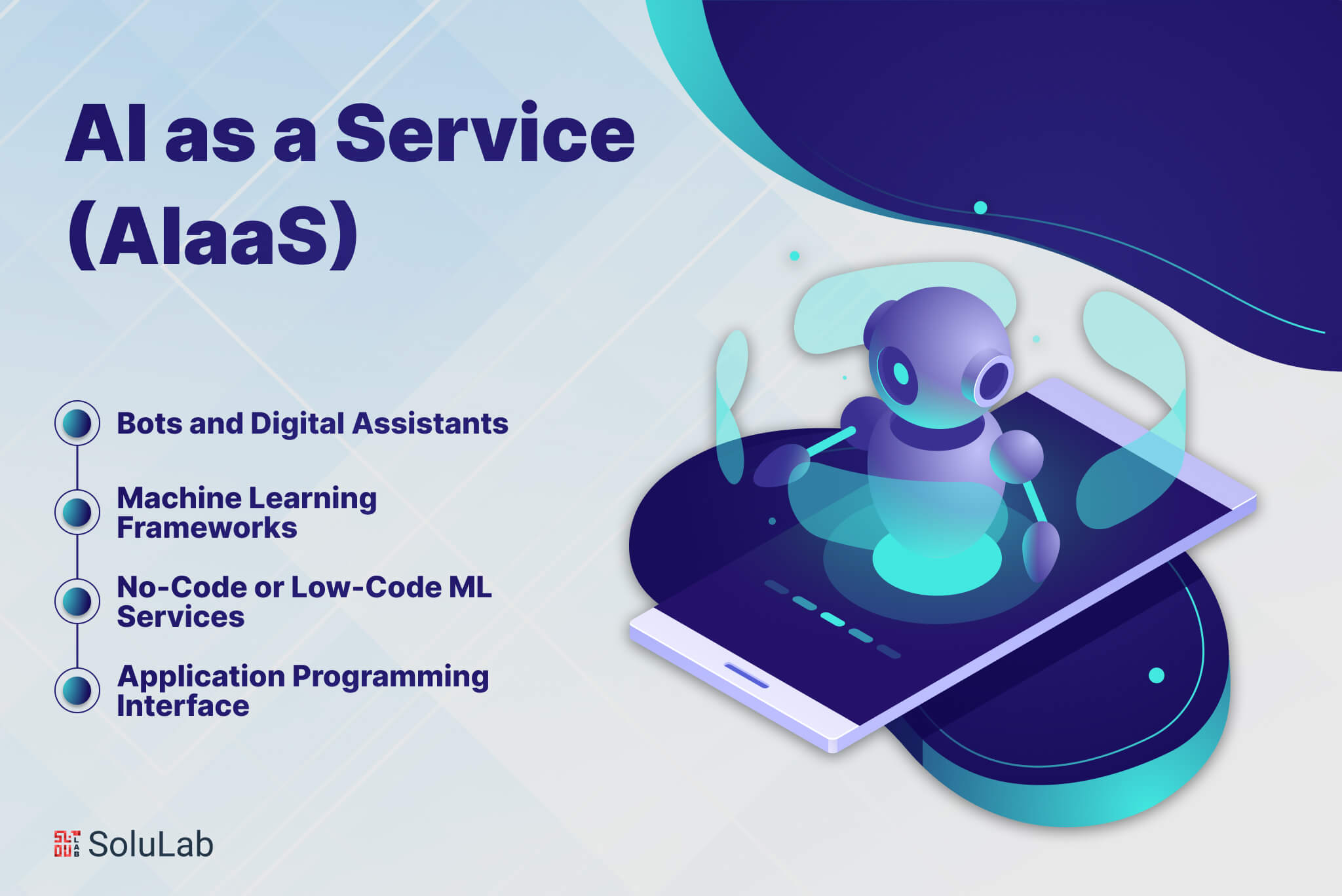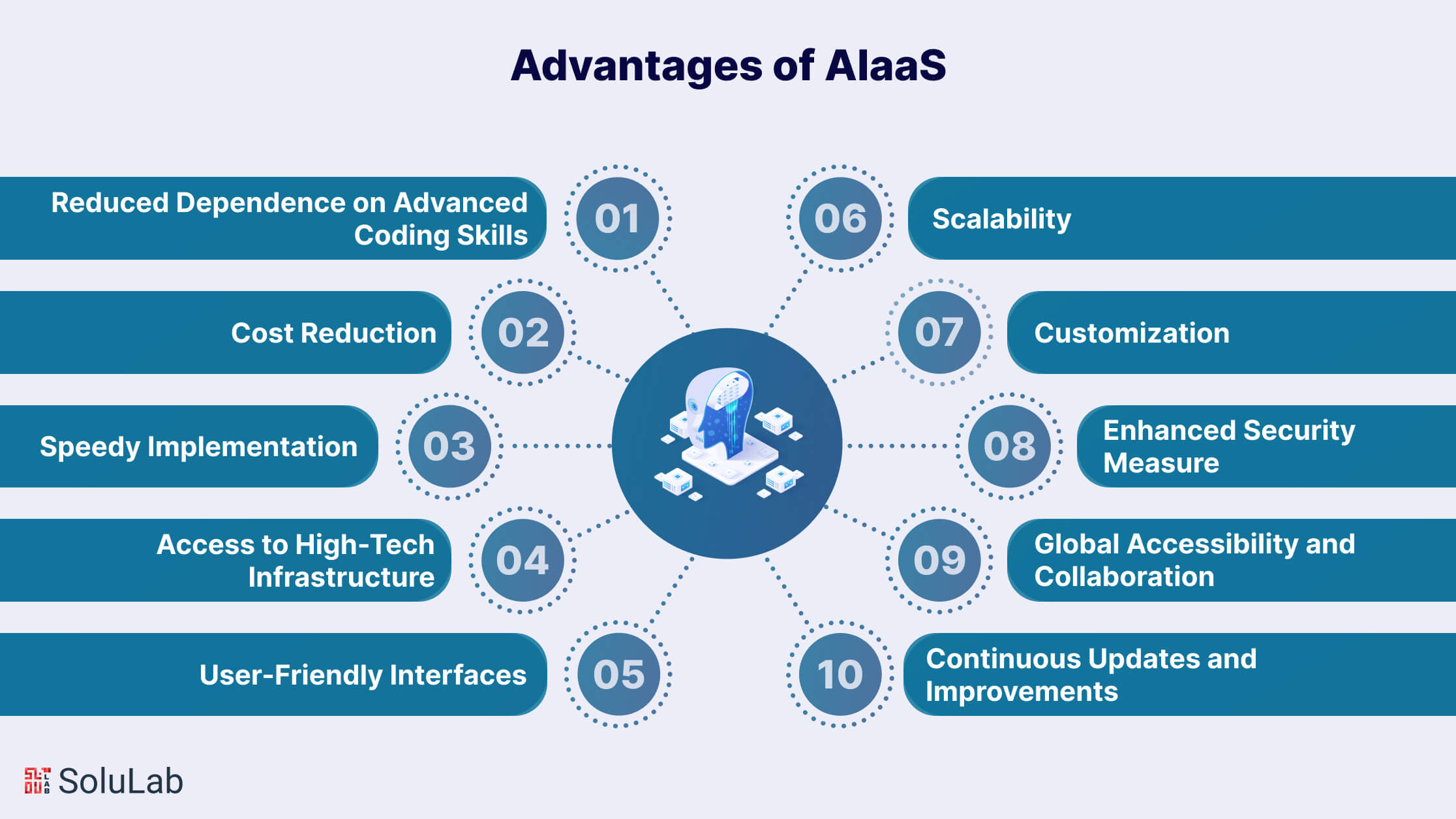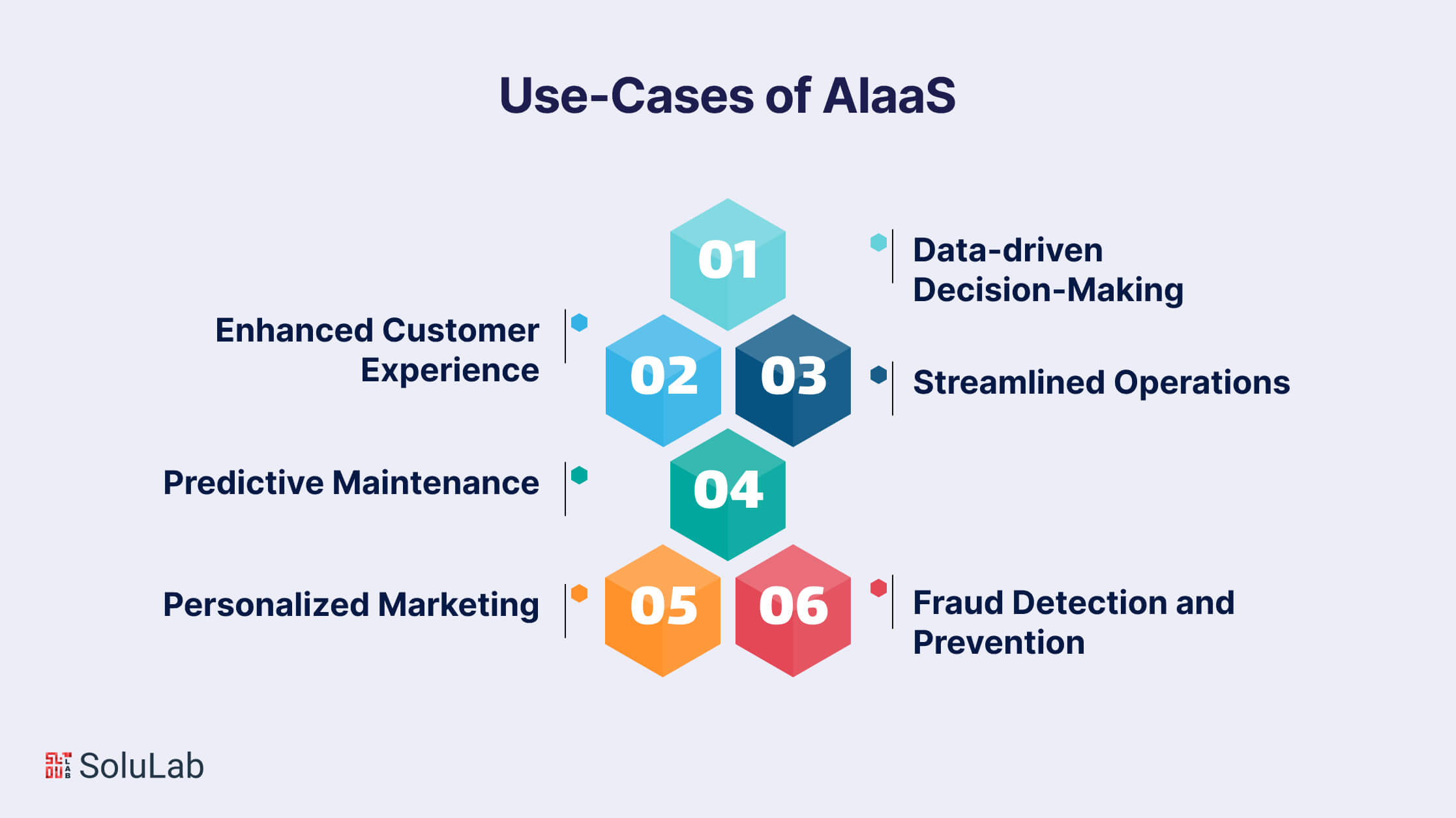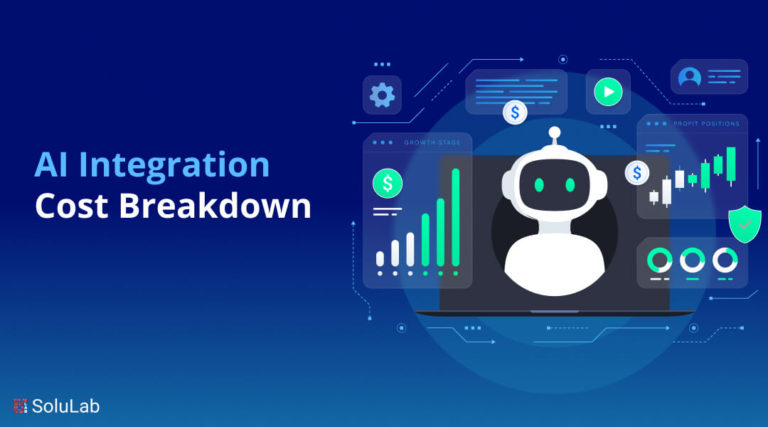
AI is changing quickly and altering the corporate environment. According to McKinsey, tasks that take up 30% of working hours could be automated by 2030 because AI is what drives automation.
Many businesses believe they cannot create or manage their systems, despite their desire to adopt AI-powered technologies. By making data and AI tools more accessible, AI as a service (AIaaS) gives companies a more cost-effective means of remaining competitive in this market.
Third-party AIaaS providers allow companies to “rent” AI tools and services according to their requirements by investing in the development and upkeep of the AI infrastructure. Businesses can create more efficient workflows and personalized AI services with this business model, which is also far more cost-effective.
What Is AI as a Service?
Third-party suppliers provide a service called AI as a service (AIaaS), which enables companies to integrate AI-powered tools and capabilities into their systems. Because companies can use AI without having to invest in resources to develop and implement it from scratch, AIaaS is a low-risk and economical strategy.
Businesses can include pre-trained models, APIs, and other AI tools from AIaaS providers in their workflows or applications. The initial outlay and continuing expenses related to developing and maintaining AI infrastructure are decreased via AIaaS.
Types of AIaaS
AIaaS encompasses various types of services that make AI capabilities accessible to businesses without the need for extensive technical expertise. Here are some key types of AIaaS:
-
Bots and Digital Assistants
Digital assistants, like virtual assistants and AI-powered chatbots, are commonly used AIaaS solutions. They leverage natural language processing (NLP) to understand and learn from human interactions. These applications find widespread use in customer service and marketing, enabling automated responses and efficient communication.
-
Application Programming Interface (APIs)
AIaaS provides APIs that allow software programs to easily integrate AI functionalities. By using these APIs, developers can incorporate powerful features into their applications with minimal code. Many AIaaS APIs focus on natural language processing, enabling tasks such as sentiment analysis, entity extraction, knowledge mapping, and translation. Additionally, some APIs offer computer vision capabilities for tasks like face detection, object recognition, and in-video search.
-
Machine Learning (ML) Frameworks
Machine learning frameworks are tools for building AI models, but they often lack a complete machine learning operations (MLOps) pipeline. AIaaS solutions in a Platform as a Service (PaaS) model offer fully managed ML and deep learning frameworks. These platforms streamline the end-to-end MLOps process, allowing developers to create, train, test, and deploy models seamlessly on the service provider’s cloud infrastructure.
Related: Use Cases of Substrate Framework
-
No-Code or Low-Code ML Services
Fully managed machine learning services within AIaaS include pre-built models, custom templates, and user-friendly interfaces that require little to no coding. This approach is designed for companies that lack development resources and don’t possess in-house data science expertise. It allows businesses to leverage AI capabilities without investing heavily in development tools.
AIaaS Architecture: Simplified Overview
AI as a Service (AIaaS) has three main parts: AI infrastructure, AI services, and AI tools.
1. AI Infrastructure: Powering AI and ML Models
AI infrastructure is like the backbone supporting AI and machine learning (ML) models. Two crucial elements make this happen:
- AI Data: Big sets of data are applied to statistical algorithms to create functional ML models. These models learn from patterns in existing data, like medical reports helping detect emergencies, cancer, or tumors. ML relies on input from various sources such as databases, unstructured data, and raw data pools.
- AI Compute: This involves using Virtual Machines (VMs), serverless computing, and batch processing to speed up ML tasks. For example, Apache Spark is a real-time data processing engine that aids in ML model computations.
2. AI Services: Accessible Cloud-based Features
AI services are ready-to-use features provided by cloud vendors, eliminating the need for custom ML models. Two types are:
- Cognitive Computing: APIs for speech, text analytics, voice translation, and search are accessed easily by developers.
- Custom Computing: Cloud providers are moving towards custom computing, allowing users to use their data to train cognitive services, reducing the complexity of choosing algorithms.
- Conversational AI: As virtual assistants gain popularity, cloud providers offer services to help developers integrate voice and text bots into their applications.
Read Also: How to Develop an AI SaaS Product?
3. AI Tools: Supporting Data Scientists and Developers
Cloud vendors provide tools to assist data scientists and developers. These tools align with the data and compute platforms:
- Wizards: Tools for amateur data scientists to simplify ML model training, acting as a multi-tenant development environment.
- IDE (Integrated Development Environment): Investments in browser-based IDEs and notebooks facilitate easy ML model testing and management for experienced developers.
- Data Preparation Tools: Quality data is crucial for ML models. Cloud vendors provide tools for data preparation, performing extract, transform, load (ETL) jobs, with outputs fed into the ML pipeline for training and evaluation.
- Frameworks: Ready-to-go VM templates with frameworks like TensorFlow, Apache MXNet, and Torch simplify the setup of data-science environments. These VMs support GPU, making them efficient for training complex neural networks and ML models.
Advantages of AI as a Service (AIaaS)

Here are some considerable advantages AI as a Service (AIaaS) brings to the table.
1. Reduced Dependence on Advanced Coding Skills
The demand for skilled AI experts is high, and so is the shortage of such professionals. AIaaS provides a practical solution by eliminating the need for expert AI developers. By introducing a layer of no-code infrastructure, businesses can achieve remarkable results without relying on a highly technical workforce.
2. Cost Reduction
AIaaS brings significant cost reduction benefits, especially in the development of AI solutions. The pricing transparency ensures that businesses only pay for the resources they use, following a pay-per-usage model. This financial flexibility is a boon for organizations looking to optimize their AI investments.
3. Speedy Implementation
The cost-effectiveness of AI-as-a-Service also translates into time savings. By streamlining the development process, AIaaS expedites AI projects. This acceleration is vital in today’s fast-paced business environment where agility can make a crucial difference.
4. Access to High-Tech Infrastructure
Implementing AI and machine learning (ML) models often requires robust GPU resources. AIaaS makes these high-tech infrastructures easily accessible. This is particularly advantageous for small and medium-sized enterprises (SMEs) that may lack the internal resources and time to build such solutions in-house. Customizability within AIaaS also allows businesses to construct task-specific models.
5. User-Friendly Interfaces
While open-source platforms offer flexibility, they can be challenging to install and develop. AIaaS addresses this concern by providing ready-to-use facets. Process owners can integrate AI software without the need for formal training. Developers benefit from end-to-end ML services, including pre-built and custom models, with drag-and-drop interfaces for simplicity. Business leaders can kickstart ML projects within hours, even without expert assistance.
6. Scalability
AIaaS is an excellent solution for businesses seeking scalability. Particularly suited for tasks requiring cognitive judgment without substantial value addition in the process, AIaaS adapts well to varying workloads.
7. Customization
Recognizing that businesses have unique goals, AIaaS allows fine-tuning to align with specific business, data, or project needs. This customization ensures that AI solutions are tailored to meet the distinctive objectives of each enterprise.
8. Enhanced Security Measure
AIaaS providers often implement robust security protocols. This ensures that sensitive data used in AI processes is safeguarded against unauthorized access and potential breaches. Businesses can leverage AI technologies with confidence, knowing that their information is handled with the utmost security.
9. Global Accessibility and Collaboration
AIaaS operates on cloud-based platforms, offering global accessibility. This facilitates collaboration among teams spread across different geographical locations. Businesses can harness the power of AI and collaborate seamlessly, fostering innovation and knowledge sharing.
10. Continuous Updates and Improvements
Providers regularly update their offerings with the latest advancements in AI technology. This ensures that businesses using AIaaS can benefit from ongoing improvements, stay competitive, and adapt to the dynamic landscape of artificial intelligence without the burden of constant maintenance and upgrades.
Popular AI as a Service Provider
AI-as-a-Service (AIaaS) providers are companies that offer artificial intelligence services through the cloud, allowing developers to access and utilize AI capabilities without having to build and maintain their own infrastructure. These services are delivered through APIs (Application Programming Interfaces), making it easier for developers to integrate AI functionalities into their applications. Let’s delve into some popular AI as a Service companies and the services they offer:
1. OpenAI
OpenAI is known for its generative AI services, providing APIs that empower developers to incorporate natural language processing features into their applications. This includes text generation, language translation, and sentiment analysis. An example of OpenAI’s work is ChatGPT, a conversational AI model.
2. Amazon Web Services (AWS)
AWS is a major player in the cloud computing space, offering a variety of AI services. These include Amazon Rekognition for computer vision, Amazon Comprehend for natural language processing, Amazon Lex for building chatbots, and Amazon Forecast for predictive analytics.
3. Google Cloud Platform (GCP)
GCP provides AIaaS with services like Google Cloud Vision for image recognition, Google Cloud Natural Language for text analysis, and Google AutoML for training machine learning models. These tools enable developers to harness the power of AI for different applications.
4. Microsoft Azure
Microsoft Azure boasts a comprehensive suite of AI services, collectively known as Azure Cognitive Services. These services cover vision, speech, language, and search functionalities. Additionally, Azure Machine Learning empowers users to create, deploy, and manage machine learning models effortlessly.
5. IBM Watson
IBM Watson is recognized for its AI services, including Watson Assistant for creating conversational AI agents and Watson Natural Language Understanding for processing and interpreting text. These services allow developers to build advanced applications with natural language capabilities.
6. Salesforce
Salesforce leverages AI to enhance its customer relationship management (CRM) solutions. This includes predictive lead scoring, automated email responses, and sentiment analysis. Salesforce’s AI-powered platform integrates seamlessly into its CRM offerings.
7. Oracle AI Platform
Oracle provides a suite of AIaaS solutions, featuring the Oracle Autonomous Database with built-in machine learning capabilities, Oracle Cloud Data Science for model building and deployment, and Oracle AI Apps for industry-specific AI applications.
8. Tencent AI Open Platform
Tencent, a prominent Chinese technology company, delivers an AI open platform offering various capabilities such as image recognition, natural language processing, voice recognition, and recommendation systems.
9. Baidu AI Open Platform
Baidu, a leading Chinese search engine, provides an open platform with AI services like image recognition, speech synthesis, natural language processing, and machine learning tools.
10. Clarifai
Clarifai specializes in visual recognition and image analysis. The company offers APIs and SDKs for tasks like object detection, image classification, and facial recognition, making it easier for developers to incorporate visual AI capabilities into their applications.
AI as a Service Across Industries
Here are some industries that can use AI to make their manual work easy and save time:
1. Healthcare: AI-powered services are changing healthcare by enabling predictive diagnostics, personalized treatment plans, and automated administrative tasks. Tools like AI-based radiology and virtual health assistants enhance patient care, improve operations, and reduce costs, making healthcare more efficient and accessible.
2. Finance and Banking: AI-as-a-Service (AIaaS) is changing finance with fraud detection, automated trading, and customer support chatbots. It offers real-time data analysis, risk assessment, and predictive modeling, enabling financial institutions to enhance security, reduce operational costs, and offer personalized financial products.
3. Retail and E-commerce: Retailers leverage AIaaS for personalized recommendations, pricing, and customer sentiment analysis. AI optimizes inventory management, predicts purchasing trends, and improves customer experience through virtual assistants, boosting sales and customer retention.
4. Manufacturing: AIaaS improves manufacturing through predictive maintenance, quality control, and supply chain optimization. AI-powered sensors detect equipment failures early, while machine learning algorithms streamline production processes, improving efficiency and reducing downtime.
5. Marketing and Advertising: AI services personalize ad targeting, automate content creation, and optimize campaign performance. AI-powered analytics tools identify consumer behavior patterns, enabling data-driven marketing strategies that increase ROI and customer engagement.
6. Transportation and Logistics: AIaaS optimizes route planning, fleet management, and delivery scheduling. Self-learning algorithms reduce fuel consumption, predict delays, and improve logistics efficiency. Autonomous vehicles and drone deliveries powered by AI are improving transportation.
AIaaS: Use-Cases

AIaaS empowers organizations to navigate the increasingly complex data-driven environment by providing readily available, pre-configured AI solutions. This eliminates the need for substantial upfront investment in infrastructure and expertise, paving the way for a seamless integration of AI into existing workflows.
Let’s explore three key use cases of AIaaS that demonstrably enhance business efficiency and customer satisfaction:
1. Data-driven Decision-Making: Traditional methods of relying solely on intuition or market trends for strategic decisions often prove suboptimal. AIaaS leverages the power of advanced algorithms to analyze vast quantities of data, uncovering hidden patterns and generating invaluable insights. This enables businesses to make informed decisions, optimize resource allocation, and navigate market fluctuations with greater certainty.
2. Enhanced Customer Experience: In today’s competitive landscape, delivering exceptional customer service is paramount. AIaaS facilitates the creation of sophisticated chatbots and virtual assistants capable of engaging in natural language interactions with customers, addressing their inquiries efficiently and tirelessly. This 24/7 availability enhances customer satisfaction and fosters brand loyalty.
3. Streamlined Operations: Repetitive, time-consuming tasks often impede operational efficiency. AIaaS offers a spectrum of automation capabilities, streamlining processes such as data entry, report generation, and scheduling. This frees up valuable human resources for higher-level activities, driving increased productivity and unlocking strategic potential.
4. Predictive Maintenance: Imagine foreseeing equipment failures before they happen. AIaaS can analyze sensor data from machinery to predict maintenance needs with remarkable accuracy. Taking action ahead of time reduces the chances of things stopping, makes equipment last longer, and saves money on maintenance.
Read Also: Use Cases Of AI Agents
5. Personalized Marketing: Targeting the right audience with the right message at the right time is crucial for marketing success. AI as a service empowers you to analyze customer data and behaviors, enabling you to personalize marketing campaigns and recommendations for each individual. This results in higher engagement, conversion rates, and customer lifetime value.
6. Fraud Detection and Prevention: Financial transactions are increasingly vulnerable to fraudulent activity. AIaaS can analyze transaction patterns and identify anomalies in real-time, flagging suspicious activity and preventing financial losses. This enhances security, builds trust with customers, and protects your brand reputation.
These are just a few use cases of how AIaaS can revolutionize your business operations. By integrating AI into your core processes, you can unlock a world of efficiency, profitability, and customer satisfaction.
Take Away
AI is a fast-growing technology that will find many uses in the future. Artificial Intelligence (AI) is like a tool that helps organizations use things like Machine Learning (ML) without spending a lot on maintenance, hiring experts, or setting up infrastructure. By leveraging AI as a Service, your business can tap into advanced capabilities such as machine learning and artificial intelligence, all while minimizing the challenges associated with maintenance overheads and the need for highly skilled personnel
The SoluLab team is ready to assist you in steering intelligent evolution for your business and technology through the use of Artificial Intelligence as a Service (AIaaS) tools. Our experts are committed to providing guidance on the seamless integration of the most suitable AI as a Service tool within your company, ensuring that it fosters business growth at a budget-friendly cost. Navigating the dynamic landscape of AI implementation can be challenging, but with SoluLab’s expertise, you can harness the power of AI without the need for extensive resources. We understand that adopting AI is a strategic move for your business, and our team is dedicated to making this process efficient and effective.
SoluLab’s commitment to AI development services extends beyond just providing a service; we aim to empower your organization with the right AI tools that align with your unique goals and objectives. Get in touch now!
FAQs
1. What is AI as a Service (AIaaS)?
AI as a Service (AIaaS) is a way to use artificial intelligence tools and capabilities without having to set up and maintain the complicated technology yourself. It’s like borrowing the power of AI without all the technical headaches.
2. How does AI as a Service work?
AIaaS works by letting you access AI features through the internet. You don’t need to worry about the technical details; you just use what you need, like translating languages or recognizing images.
3. Why would a business use AI as a Service?
Businesses use AI as a Service to get the benefits of AI without spending a lot on technology and experts. It helps them do things like predicting trends, understanding data, and improving customer experiences.
4. What kind of tasks can AI as a Service help with?
AIaaS can assist with various tasks, such as analyzing data, recognizing patterns, and even understanding human language. It’s versatile and can be applied to different needs.
5. Are there different types of AI services available?
Yes, there are various AI services, each specializing in different tasks. Some focus on language translation, others on image recognition, and some on predicting future trends.
6. Is AI as a Service secure and compliant with regulations?
Reputable AIaaS providers prioritize security and follow rules and regulations to protect your data. Before choosing a service, it’s good to check if it complies with privacy laws and industry standards.






